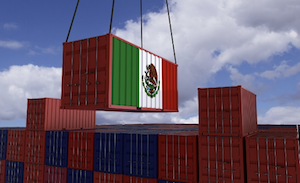By Brenda Cordova, Braumiller Law Group Mexico Legal Counsel
One of the most important requirements for importing goods into Mexico is to be registered as an importer under the Mexican importer’s registry. There are 2 types of registries for importers, one is for general importers (Padron de Importadores), and the other is for importers of specific industry sectors (Padron the Importadores de Sectores Especificos) which may import goods identified by the MX tariff code (i.e. chemical products, firearms, cigars, footwear, textiles, alcohol, hydrocarbons, steel, automotive, etc.). Generally, these 2 registries are lists with information of individuals and entities authorized to bring goods into Mexico. Therefore, anyone intending to import must be on the list.
As of December 31, 2023, there were 131,091 active members registered under the Mexican Importer’s Registry (Padron de Importadores) and 34,000 under the Specific Sector Importer’s Registry (Padron the Importadores de Sectores Especificos).
The requirements to register as a MX importer are relatively simple as applicants would need an active MX tax ID number and e.firma (electronic signature), a valid tax domicile in Mexico, mailbox for tax purposes, a MX Customs broker or customs legal representative and evidence of tax compliance. The application is submitted via the SAT portal and a response is received within 6 days.
Unfortunately, losing the registration can occur with alarming ease and surprising simplicity. In fact, losing it is one of the things importers fear the most because if this happens, they will not be able to import anything at all. Even more concerning is that obtaining the importer’s registration back can be very challenging and weeks may pass before there is a resolution.
According to the MX General Customs Rules, there are 47 reasons why an importer’s registration can be suspended and removed from the registries. Some of them are when the Mexican importer:
- Fails to file his federal tax reports.
- Fails to show tax and customs compliance.
- Fails to inform MX customs when opening or closing facilities where foreign goods are kept.
- Fails to include the product’s trademark on the pedimento (MX customs form).
- Fails to respond to requests from the tax or customs authorities.
- Fails to inform MX customs about a change to his name and address.
- Fails to pay the full amount of duties and fees, confirmed by a final court ruling.
- Fails to correct its tax status per a court order resulting from an origin verification proceeding.
- Fails to comply with the obligations related to their certifications relate to VAT and IEPS certified companies, or those using bonds to guarantee the payment of taxes, fail to comply with their obligations.
- Does not import for more than 12 months in a row.
- Does not have the documentation evidencing the foreign trade operations.
- Does not keep records, inventories, controls, or hides, alters, or destroys them.
- Does not export or return goods abroad within the allowed times.
- Cannot be located at the address on record.
- Submits false documentation.
- Alters records or documents covering foreign trade operations.
- The legal representative, partner or shareholder is a member of a company whose importer’s registration has been cancelled.
- Is under criminal investigation for tax, industrial property, or copyright matters.
- Declares an exportation or return of goods abroad, however, the goods do not leave the country.
- Uses incorrect classification codes.
- When specific industry sectors fail to comply with requirements applicable to the corresponding industry sector.
- When an IMMEX does not have the goods within the authorized facilities.
- When an IMMEX does not have the required infrastructure to perform maquila operations
- When an IMMEX imports goods which are not authorized under its program
- Others.
Additional reasons can be found under the MX customs law and its Regulations:
- The importer has irregularities and inconsistencies under his taxpayers’ federal registry.
- The importer changes its address or name and does not update the information under the Padron.
- When a final binding ruling determines that the importer committed violations to the customs legal provisions.
- When the importer fails to pay the full amount of customs duties and countervailing duties.
- When IMMEX imports goods not authorized under the IMMEX authorization.
- Others.
Importers whose registration has been suspended may request MX Customs to nullify such suspension and to incorporate their name back to the Padron. To do this, the importer must submit and file before MX customs the appropriate form and documentation demonstrating that errors or violations of the law have been corrected and that unpaid duties, taxes or fees have been paid in full, if any. The regulations set forth that Mexican customs shall respond within a period of 15 days. Even so, the importer should expect delays due to the time needed to: i) identify the error or violation, ii) gather and prepare the information and documentation, iii) make corrections, iv) make payments, if any, and moreover, v) the time MX customs may take to review and validate the submitted information/documentation and the internal communication regarding the same between the MX customs departments involved.
This could be disastrous for some Mexican importers as not all of them can survive a restriction on their importations for any period of time, especially when they have commercial and legal responsibilities with third parties (supplier, buyers, distributors, etc.). Therefore, to avoid and minimize the risk of suspension from the importer’s registries above, the importer should be in constant and permanent compliance with the MX customs legal provisions and should implement internal assessments to limit any areas of concern.
Disclaimer: This publication is presented to you for informational purposes only and is not intended to provide legal guidance or advice. Please email us if you need specific information regarding the above or give us a call, we are happy to speak with you.

